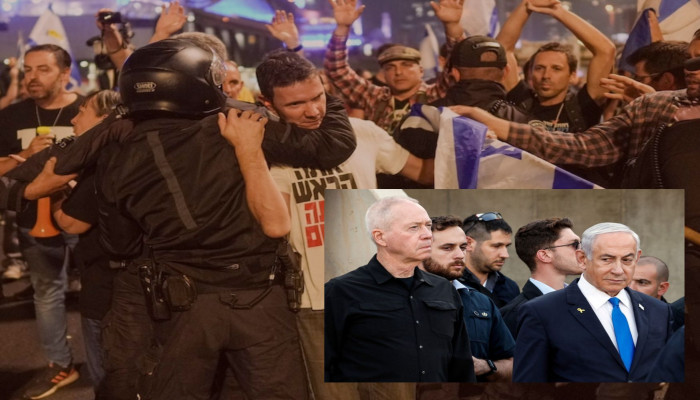Netanyahu dismisses Defense Minister Gallant, sparking protests and policy shifts
- In Reports
- 10:20 PM, Nov 06, 2024
- Myind Staff
In a surprising announcement on Tuesday, Israeli Prime Minister Benjamin Netanyahu dismissed his popular Defense Minister, Yoav Gallant, amid escalating conflicts across the region. The decision sparked nationwide protests.
Netanyahu and Gallant had long disagreed on the Gaza war strategy, though Netanyahu had previously refrained from removing Gallant, especially as global attention centered on the U.S. presidential election. In his statement on Tuesday evening, Netanyahu cited "significant gaps" and a "crisis of trust" between them as reasons for the dismissal.
"During wartime, absolute trust between the prime minister and defense minister is essential," Netanyahu stated. "While the early months of the campaign saw strong collaboration and mutual trust, this trust has deteriorated in recent months."
“In the midst of a war, more than ever, full trust is required between the prime minister and defense minister,” Netanyahu said. “Unfortunately, although in the first months of the campaign there was such trust and there was very fruitful work, during the last months this trust cracked between me and the defense minister.”
In the early days of the war, Israel’s leadership appeared unified in response to Hamas' October 7, 2023, attack. However, as the conflict has persisted and extended into Lebanon, significant policy differences have surfaced. Netanyahu has consistently advocated for sustained military pressure on Hamas, while Gallant has taken a more pragmatic stance, suggesting that military action has set the stage for a potential diplomatic arrangement to secure the release of hostages held by the militant group.
Many of the hostages' families, along with tens of thousands of anti-government protesters, accuse Netanyahu of blocking a deal to retain his grip on power.
Netanyahu's hard-line allies have warned they might bring down the government if he makes concessions to Hamas, intensifying the risk of early elections while the prime minister’s popularity remains low. "Firing Gallant in the midst of a war is an act of madness," opposition leader Yair Lapid posted on X. "Netanyahu is sacrificing Israel’s security and its soldiers for disgraceful political survival."
The grassroots group representing hostage families condemned Gallant’s dismissal, calling it a clear attempt to derail a potential hostage deal. The group urged the newly appointed defense minister, Israel Katz, to commit openly to ending the war and securing an agreement to bring their loved ones home.
Within hours, thousands of protesters gathered in central Tel Aviv, blocking the city's main highway. Waving blue and white Israeli flags, blowing whistles and pounding drums, they circled a small bonfire set in the middle of the road. Meanwhile, about 1,000 protesters assembled outside Netanyahu’s residence in Jerusalem, and others blocked roads in various parts of the country.
Gallant’s dismissal comes at a precarious moment. Over a year after Israel's initial incursion, troops remain entrenched in Gaza, while ground forces advance in a month-long campaign against Hezbollah in Lebanon. Israel is also facing clashes with Iranian-backed groups in Iraq, Syria, and Yemen, with the looming possibility of another Iranian strike. Iran has vowed to retaliate after an October 1 Israeli attack, which followed Iran’s missile strike in reprisal for earlier Israeli actions against its affiliates.
Israel’s Channel 12 reported that Netanyahu’s decision to dismiss Gallant was driven by Gallant’s recent move to issue thousands of draft notices to young ultra-Orthodox men.
Under a longstanding, contentious arrangement, ultra-Orthodox men are exempt from the military service required of most Jewish citizens, a policy that has stirred resentment among the secular majority. Israel’s Supreme Court has ordered the government to abolish the exemption, but Netanyahu, whose coalition relies on ultra-Orthodox parties, has yet to act on the order.
Earlier on Tuesday, Gallant visited troops stationed near the Lebanese border, where he emphasised the importance of enlisting ultra-Orthodox soldiers to strengthen security and foster national unity. “This is the people of Israel. There is no one else,” he stated. Channel 13 reported that Netanyahu used the timing of the U.S. election, with American attention diverted, to dismiss Gallant. The White House declined to comment on Gallant’s firing but referred to him as a valued partner on Israel’s defense issues.
The White House National Security Council expressed its intention to "continue to work collaboratively with Israel's next Minister of Defense."
Gallant, a respected former general known for his straightforward approach, issued a statement affirming, “The security of the state of Israel always was, and will always remain my life's mission.” He was expected to address the nation on television later on Tuesday. Meanwhile, 69-year-old Israel Katz, a former junior military officer with limited defense experience but a longstanding role in Netanyahu’s Security Cabinet, will assume the defense role. Gideon Saar, a former rival who rejoined Netanyahu's government in September, will take over as foreign minister.
Netanyahu, known for sidelining rivals, stated that he had made repeated efforts to resolve his differences with Gallant. “But the gaps kept growing. Worse, these issues became public in an unacceptable way, and even worse, our enemies took note and exploited the situation to their advantage,” he remarked.







Comments